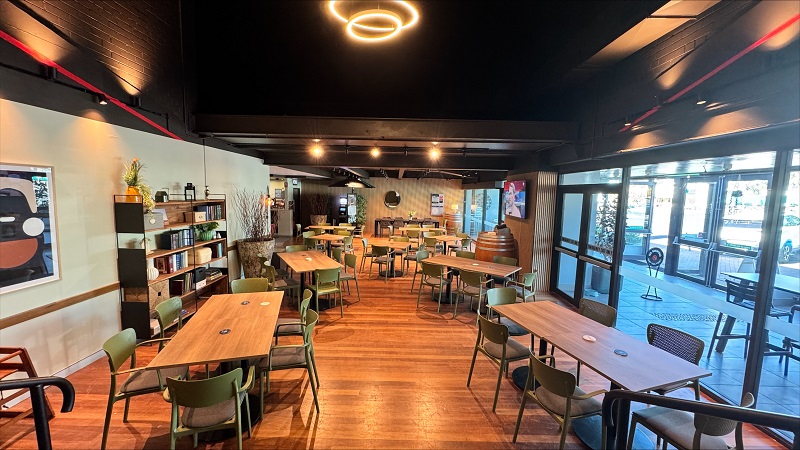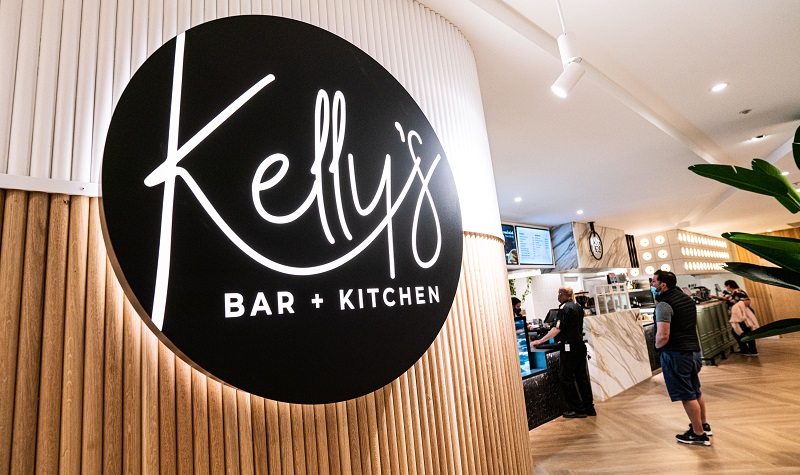At Club Forbes in regional NSW, an old squash court and former cafe space have been transformed into The Rosemary Cafe, a multi-functional venue with its own entrance and views of the town’s main park. The renovation was more than a facelift; it marked a deliberate shift to revise the club’s cafe offering.
“It was identified through looking at what’s happening out there, in club land and also in the coffee shop space, there was inconsistency with people not opening all the time … and we identified that there was an opportunity to open every morning at eight o’clock,” Club Forbes CEO Peter Gasson told Club Management.
When a popular local cafe closed, taking its cult-status coffee with it, it propelled Club Forbes’ plans to deliver a new cafe that would fill a gap. The club partnered with the same Sydney-based roaster, Pablo & Rusty, and brought on some of the former cafe’s staff. In a country full of discerning coffee drinkers, quality and consistency were priorities for Club Forbes.
“All Australians know what a good coffee is. For us, it’s all about consistency, and making sure that each and every time you come in here, you’re getting that premium product,” Gasson said.
David Downing, Oceania business development director at Franke Coffee Systems, said automation is increasingly vital in maintaining quality without placing extra pressure on staff.
“Operational costs within the hospitality sector have increased substantially post-Covid, impacting positive revenue growth within the club sector,” he said.
“There’s also downward pressure on availability of staff, with greater need for multi-skilled staff who can seamlessly move into different roles without extensive or ongoing training, also compounded by increased costs in wages, consumables and beans.
“This is when automation plays a critical role in lowering operational costs without impacting quality. Its efficiencies reduce pressure on staff by removing time-consuming tasks.
“High-quality automatic coffee equipment is essential, with innovation and technology driving club expectations and purchasing decisions, not only efficiencies for staff, but reducing waste, improving speed of service, improving reliability, remote monitoring through telemetry, and providing accurate technical, sales data and inventory management.”
He added that strong technical after-sales support is just as important as the technology itself.
“Franke works very closely with many roasters in Australia. This is important so the equipment supplier, roaster and club all work collaboratively to profile that quality and perfect coffee, serve after serve,” Downing said.
Sip of change
But coffee is no longer the only drawcard at Club Forbes. Frappes and iced coffees have also been a hit.
“During summer, iced coffees were a huge seller for us,” Gasson added.
“Our food and beverage manager, Abbey, has a good handle on what it is that young people are seeing on social media, and she brings those ideas to the club.”

The shift toward trendier and wellness-aligned drinks isn’t unique to Club Forbes. At Bankstown Sports’ Cornerstone Coffee & Kitchen, demand is rising for fresh juices and açai smoothies.
“As more people prioritise wellness and healthier choices, these options are becoming go-to favourites, especially among our morning and lunchtime crowds,” said Evan Burgess, culinary director of Bankstown Sports.
Cold-pressed juices, smoothies and “functional wellness shots” are becoming staple items on modern club cafe menus, a trend also noted by Kuvings Australia’s resident juice chef Gary Dowse.
“These drinks not only taste great, but they’re packed with nutrition, colour, and appeal for a broad demographic, from morning gym-goers to social lunch crowds,” he said.
“All Australians know what a good coffee is.”
Peter Gasson, Club Forbes CEO
At Cornerstone Coffee & Kitchen, the focus on beverages is supported by a menu of popular staples, including artisan, all-butter flaky croissants from Brasserie Bread, handmade pies and avocado toast. Seasonal items such as spicy meatball paninis and gruyere monsieur toasties rotate through in winter. But above all, Burgess said reliable coffee and great service keep members coming back.
“Partnering with a trusted coffee supplier ensures we deliver a premium experience in every cup. Just as important is knowing our beans are ethically and sustainably sourced, it reflects our commitment to responsible practices and the expectations of our customers,” he said.
As club cafes grow busier and more diverse in their offerings, the right equipment is becoming just as important as ingredients, according to Dowse.
“Having tools that handle volume, minimise prep and simplify service allows staff to focus on consistency, quality and speed,” he said.
Keeping it classic
At Panthers Penrith Leagues Club, the cafe model is a little more traditional — and that’s by design.
“The cafe is driven more to our business needs. A lot of cafes are a lot more restaurant in style … but our cafe offers melts, sandwiches, and it’s quite traditional,” Penrith Panthers food, beverage and events executive manager Louise Ruxton said.
She explained it’s a space where post-exercise groups and regular Bingo players meetup for an in-between feed, with a good cup of coffee often being the main attraction.
“It’s the hub for quick, quality coffee,” Ruxton said.
“When you go to a new and modern cafe, it’s about the barista, while here it’s about the customer and making the coffee to their liking.”
No matter the style, one thing is clear: the club cafe has evolved.
“The cafe is no longer just a convenience — it’s a key touchpoint for connection, community and care,” Dowse said.
“With the right tools and a wellness-first approach, clubs can create cafe spaces that are both profitable and aligned with the modern lifestyle of their members.”

